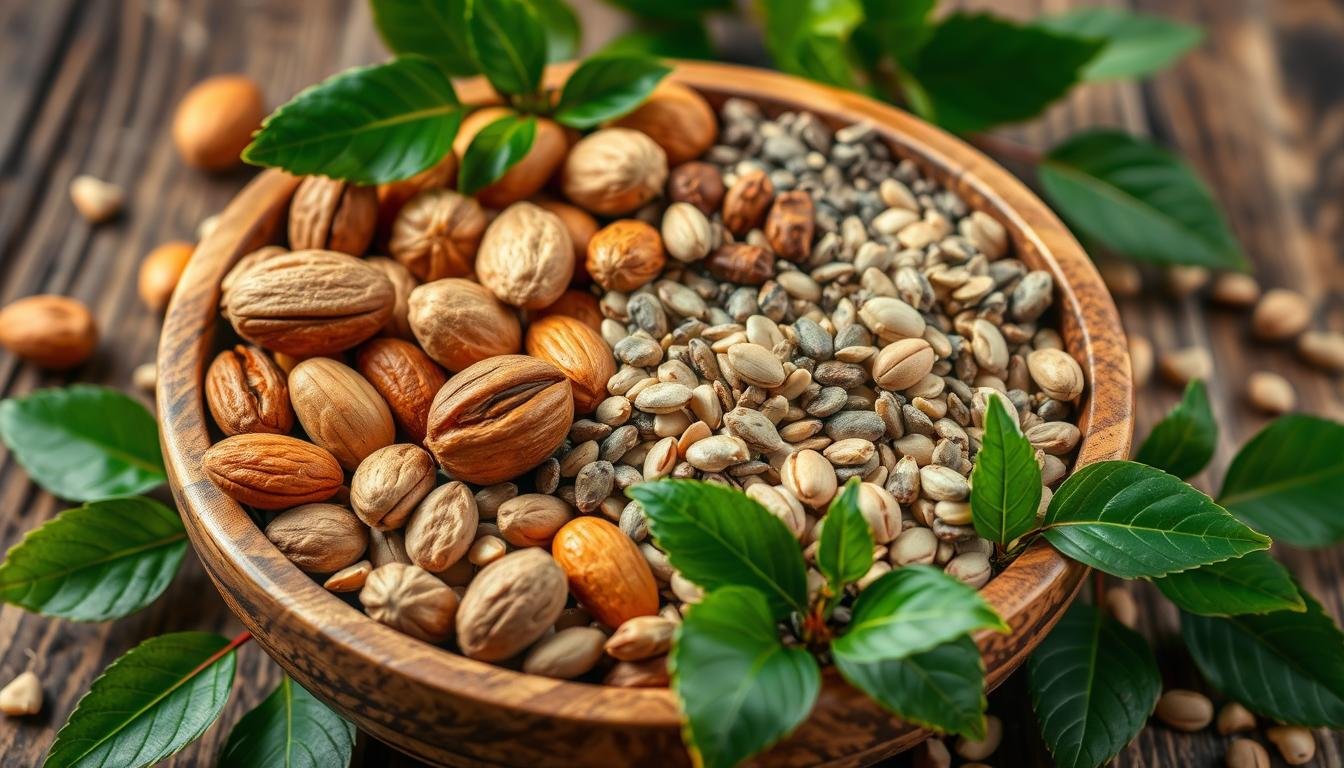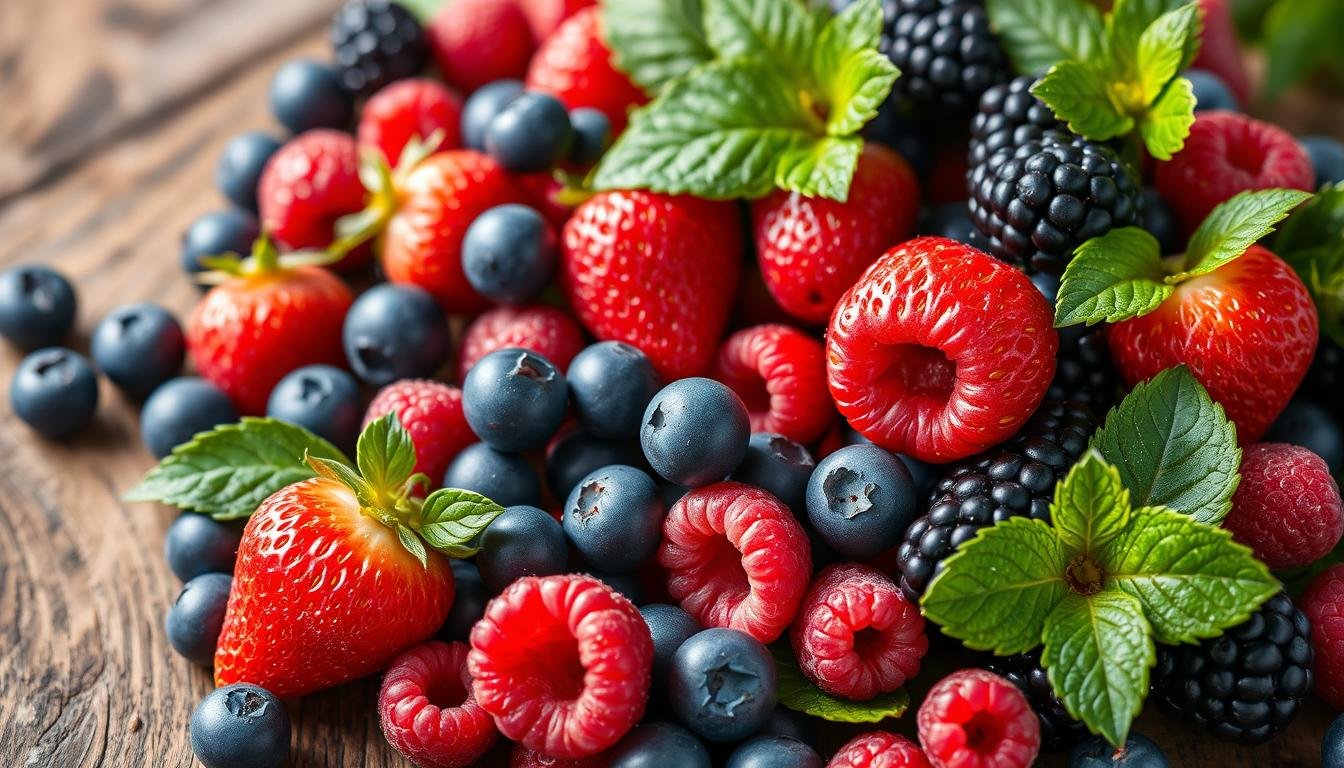Did you know the average American eats around 17 teaspoons (71 grams) of added sugar each day? This is way above what the American Heart Association recommends. They say women should have no more than 6 teaspoons (24 grams) and men 9 teaspoons (36 grams) of added sugars daily. Understanding which foods are full of refined carbs and sugars is key to staying healthy and preventing chronic diseases.
About 75% of packaged foods have added sugar, making it important to know what to skip for better health and weight control. Diets loaded with refined carbs are linked to health problems like heart disease and diabetes. By knowing which foods to avoid, you can make smarter food choices. This helps start a journey towards a healthier life.
Key Takeaways
- The average American exceeds daily sugar intake recommendations significantly.
- About 75% of packaged foods contain added sugars.
- Limiting refined carbs helps in chronic disease prevention.
- Understanding food labels is key to identifying high sugar content.
- Choosing complex carbohydrates can boost overall health.
Understanding Refined Carbohydrates
Refined carbs are common in many processed foods. These foods have gone through a lot of processing. This removes important nutrients like fiber, vitamins, and minerals. Hence, they’re often called “empty carbs.” They give quick energy but lack serious nutritional values. Foods like white bread, pastries, and sugary snacks are examples. They can cause fast increases in blood sugar.
The process takes out the bran and germ from grains. This leads to less healthy compounds. Foods full of refined carbs, like white rice and pasta, are cheaper. This is because they last longer. But, their low price comes with a health risk.
- Common refined carbohydrate sources include:
- Soda
- Cookies and cakes
- Pastries and desserts
- White bread and rice
It’s key to know how much to eat. For example, a carb serving is about 15 grams. This is around ¼ cup of granola. It shows why it’s important to watch how much we eat.
Switching to whole grain foods can make us healthier. Picking whole wheat pasta or tortillas is better than refined types. The Dietary Guidelines for Americans suggest that carbs should be 45% to 65% of our total daily calories. For a 2,000 calorie diet, that means 225 to 325 grams of carbs a day. Less than 10% of these should be from added sugars.
Eating whole fruits instead of juice or trying grains like quinoa and barley adds taste and nutrients. Whole carbs help reduce the chance of heart disease, obesity, and type 2 diabetes. It’s important to balance refined and whole carbs for good health.
Health Risks Associated with Refined Carbs
Refined carbs are a big part of many diets. They come with serious health risks like obesity, type 2 diabetes, and heart disease. The way they change blood sugar and hunger is the problem.

High glycemic foods cause quick blood sugar spikes and drops. This leads to cravings and overeating. It raises the risk of obesity and type 2 diabetes. Diets rich in refined carbs usually lack needed fiber.
Refined grains like white bread and pasta are everywhere. They have less nutrients than whole grains. Sugary snacks and desserts, filled with refined sugars, add to the problem.
Long-term use of refined carbs can cause body inflammation. This makes regulating hunger and fat harder. Over time, this increases the risk of heart disease and other illnesses.
To avoid these health risks, switch refined carbs with healthier options. The American Heart Association suggests eating less refined sugar and more fiber-rich foods. This can improve your health. For tips on carb choices, check this resource.
Foods High in Refined Carbs and Sugars: What to Avoid
Dietitians stress the need to know what foods to avoid. Refined sugars often find their way into our meals and harm our health. Knowing which foods, especially processed ones, to avoid can help us make better food choices.
Here’s a list of foods to stay away from:
- White bread – Made from refined flour, it’s missing the nutrients found in whole grains.
- Pastries and sweets – Foods like donuts and cookies are full of sugar and refined flour.
- Sugary drinks – A single soda can have up to 10 teaspoons of added sugar.
- Candy – Full of refined sugars, candy lacks nutritional value.
- Breakfast cereals – Some have a lot of added sugar, like Post Golden Crisp with 21 grams per serving.
Eating these foods can make us exceed our calorie needs. Americans average 71 grams of added sugar each day. The American Heart Association suggests women limit this to 24 grams and men to 36 grams. About 75% of foods in stores have added sugar, often under different names.

Processed foods increase our carb intake, which should be below 275 grams for a 2,000 calorie diet. Eating too much refined sugar and carbs can lead to serious health issues. These include type 2 diabetes and heart disease over time.
It’s important to know these foods. This knowledge helps us keep our diet balanced. Making healthier choices boosts our overall health.
The Difference Between Refined and Whole Carbohydrates
It’s important to know the differences between refined vs. whole carbohydrates. Whole carbohydrates come from foods that keep their natural form. These include whole grains, fruits, and vegetables. They are full of essential nutrients like fiber, vitamins, and minerals. This helps with overall health.
Refined carbohydrates are processed a lot. This process removes the bran and germ which have most of the nutrients. We get foods like white bread and pastries. They digest quickly, causing blood sugar spikes and crashes. This can lead to overeating and health problems like diabetes and heart disease.

Whole foods have complex carbohydrates that digest slowly. This keeps energy levels steady. Foods high in dietary fiber, like beans, legumes, fruits, and grains, are good for digestion. They help you feel full. On the other hand, simple carbohydrates from sugary snacks and refined grains are not nutritious. They can harm your health.
| Carbohydrate Type | Examples | Nutritional Benefits |
|---|---|---|
| Refined Carbohydrates | White bread, pastries, sugary cereals | Limited nutrients; high glycemic index |
| Whole Carbohydrates | Brown rice, quinoa, fruits | Rich in fiber, vitamins, and minerals |
To eat better, focus on whole foods over refined ones. This can boost your nutrition and health. Adding more foods filled with fiber and nutrients can improve energy and lifespan. For tips on choosing better, visit this guide on whole carbs vs.
Common Sources of Refined Sugars
Refined sugars are common in many foods we eat daily. Knowing common sources helps manage health, especially for those with diet needs. Flavored yogurts, pastries, cookies, and sodas have a lot of added sugars.
Processed foods like fruit juices and various condiments are also sugar-rich. These might seem healthy but can deceive. For instance, nonfat sweetened fruit yogurt can have up to 47 grams of carbohydrates, hiding lots of sugar.
Americans eat about 17 teaspoons (71 grams) of added sugars every day. That’s way above the American Heart Association’s suggestions. They recommend up to six teaspoons for women and nine for men. It’s important to know how much sugar is in fast food and packaged goods if you want to eat better.
You could try whole-grain bread instead of white, or oatmeal over sugary cereals. These changes cut down sugar and boost health.
To learn more about reducing processed foods and sugar, check out common sources of refined sugars.
Identifying Processed Foods in Your Diet
It’s important to know what processed foods are in your diet. Many people eat a lot of processed items without realizing it. These items often carry refined carbs and hidden sugars. So, it’s key to read food labels carefully. This helps you find added sugars and bad ingredients, which can cause health problems.
Processed foods come in different types. Ultra-processed foods make up 25-60% of what many eat every day. They usually have five or more ingredients, including things not found in home cooking. Knowing about food processing steps is important. There are primary, secondary, and tertiary levels to understand.
Looking at food labels can tell you a lot about sugar. Names like syrup, sucrose, maltose, and dextrose mean added sugars. The American Heart Association recommends men limit added sugars to about 9 teaspoons (36 grams) per day. Women should try for less, about 6 teaspoons (25 grams). Cutting down on added sugars can help you manage your weight and lower your risk for many health problems.
Choosing products with fewer ingredients is smart. It leads to healthier eating habits by cutting down on extra sugars and fats. By eating more whole foods like fruits and veggies, you can eat better and feel better too.
| Type of Processed Food | Common Ingredients | Health Considerations |
|---|---|---|
| Ultra-Processed Foods | Sugars, trans fats, artificial additives | Linked to obesity, heart disease, cancer |
| Processed Foods | Salt, preservatives, added sugars | High in calories, risk of chronic diseases |
| Whole Foods | Fruits, vegetables, grains | Supports overall health, reduces disease risk |
By learning to identify processed foods, you can choose healthier options. Paying attention to food labels lets you make better food choices. In turn, this can lead you to a healthier way of living.
Choosing Alternatives: Healthier Options
Making better food choices can greatly improve your health. Opting for healthier foods instead of refined carbs and sugars boosts nutrition and energy.
Choosing whole grains over refined ones is a good move. Brown rice and quinoa are great substitutes for white rice. They offer more fiber and essential nutrients. According to the American Heart Association, it’s important to eat less added sugars and more complex carbohydrates for better health.
For dairy, go with natural yogurt instead of the sweetened kinds. Sweetened yogurts have extra sugars that can spike your blood sugar. You can enjoy plain yogurt with fruits for a sweet, healthy snack without the added sugar.
Fruits are a wonderful way to satisfy a sweet tooth. Apples, bananas, and berries are tasty and high in fiber. They’re naturally sweet and better than refined sugars. Drink 100% fruit juice over concentrates to cut down on sugar.
Use natural sweeteners like honey or maple syrup instead of refined sugars. But only use a little. This can help you focus on eating foods that are good for you, rather than foods with lots of added sugar.
Switching to healthier foods is easier than you might think. Making small changes in what you eat can make you healthier over time. Eating whole foods is tasty and good for your health and longevity.
Tips for Managing Sugar Cravings
Feeling overwhelmed by sugar cravings is common, but there are ways to make it easier. Adopting healthy eating habits is key to reducing the need for sugary snacks. Here are practical steps to help master those cravings:
- Incorporate high-protein meals: Starting with a protein-rich breakfast like eggs can curb hunger. This helps manage sugar cravings throughout the day.
- Stay hydrated: Drinking water before meals can cut down on hunger. It’s great for weight loss and keeping cravings in check.
- Keep meal timings consistent: Eating at regular times trains your body to expect food, reducing random snacking urges.
- Choose nutrient-dense snacks: Snacking on yogurt or trail mix in moderation satisfies cravings with fewer calories.
- Practice mindful chewing: Chewing gum can decrease the urge for sugary snacks, aiding in craving management.
- Implement stress management techniques: Managing stress well can lower the crave-inducing effects of certain hormones.
Managing sugar cravings takes patience and trying different methods. A mix of strategies helps find what works best for you. Rewarding yourself for resisting cravings supports lasting healthy eating habits.
Conclusion
Staying away from foods high in refined carbs and sugars is key for better health. Obesity and type II diabetes are becoming more common worldwide. Moving to whole foods brings important nutrients and big health advantages. This helps people make lasting changes to what they eat.
Cutting down on refined carbs and choosing foods that don’t spike blood sugar is important. Eating foods like legumes, fruits, and whole grains helps the gut. They also help the good microbes that support our mental and physical health. Making these diet changes can cut the risk of long-term health problems.
Making smart choices about carbs and sugar leads to a healthier future. This helps with keeping a healthy weight. It also takes into account nutrition, mental health, and preventing diseases.


